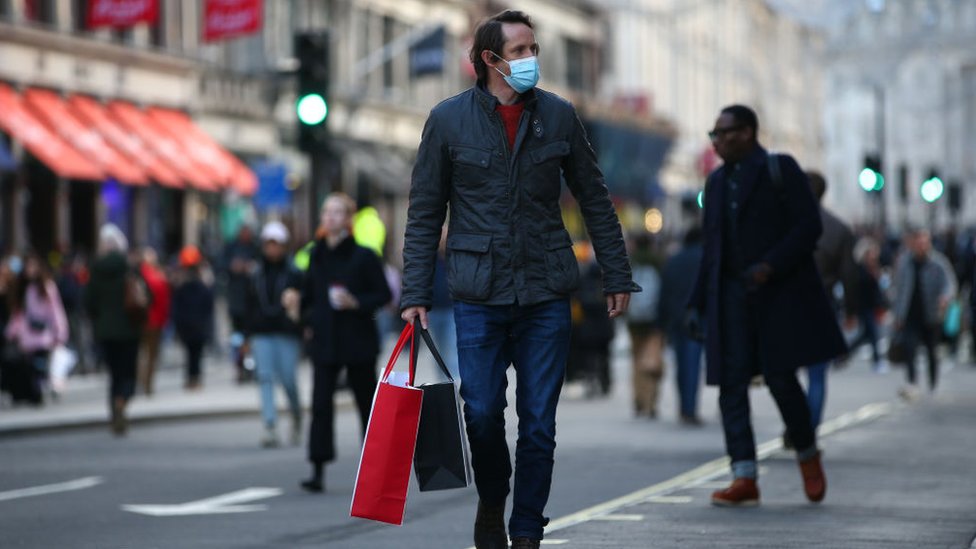
More areas of England are being placed under the toughest coronavirus restrictions, from 00:01 GMT on 31 December. The government estimates that over three quarters of the country will be under tier four measures from then.
Other parts of England are also joining higher tiers, to curb the spread of a new variant of Covid-19.
Mainland Scotland and Northern Ireland started new lockdowns on Boxing Day. The whole of Wales has already entered lockdown.
What are the Covid rules in England?
All areas of England can be placed in one of four tiers, depending on factors such as how fast Covid is spreading and pressure on hospitals.
People in tiers one to three should not to travel into tier four areas. Across all tiers, people should now “stay local”.
There are exceptions in all tiers for childcare and support bubbles.

From 00:01 GMT on Thursday 31 December the following places are in tier four:
- Leicester City and Leicestershire
- Lincolnshire
- Northamptonshire
- Derby and Derbyshire
- Nottingham and Nottinghamshire
- Birmingham and Black Country
- Coventry
- Solihull
- Warwickshire
- Staffordshire and Stoke-on-Trent
- Lancashire
- Cheshire and Warrington
- Cumbria
- Greater Manchester
- Tees Valley
- North East
- Gloucestershire
- Somerset Council
- Swindon
- Bournemouth, Christchurch and Poole
- Isle of Wight
- New Forest
London and much of the South East of England were already in tier four and will remain there. The tiers are reviewed every two weeks.
What are the restrictions in tier four?
The restrictions are similar to the last national lockdown and include:
- Residents should stay at home, unless they have a “reasonable excuse” such as work or education
- All non-essential shops must close
- Hairdressers and nail bars must close
- Indoor entertainment venues must close
- Gyms and indoor swimming pools, indoor sports courts and dance studios must close
- You cannot meet other people indoors, unless you live with them or they are part of your support bubble
- People should not leave tier four areas or travel abroad, except for limited reasons (including work and education)
- Weddings and civil partnership ceremonies are only allowed in exceptional circumstances
“Clinically extremely vulnerable” people in tier four areas are advised to stay at home “as much as possible”. The government says if they can’t work from home, they shouldn’t go to work.
What can you do in tier four?
Activities still allowed include:
- Meeting one other person from another household in an open public space, if you are both alone
- Shopping for essentials such as food and medicine
- Outdoor pools, playgrounds, sports courts, golf courses and horse riding centres can open
- You can leave home for work, education, training, childcare and for medical appointments and emergencies
- Communal religious worship
- Support bubbles are still allowed and children can move between separated parents

From 00:01 GMT on Thursday 31 December the following places are in tier three:
- Rutland
- Shropshire and Telford & Wrekin
- Worcestershire
- Herefordshire
- Liverpool City Region
- York and North Yorkshire
- Bath and North East Somerset
- Devon, Plymouth, Torbay
- Cornwall
- Dorset
- Wiltshire
What are the restrictions in tier three?
- You can’t mix indoors, in private gardens or in most outdoor venues, except with your household or bubble
- You can meet in a group of up to six in other outdoor spaces, such as parks, beaches or countryside
- Shops, gyms and personal care services (such as hairdressing) can stay open, as can swimming pools
- Bars, pubs, cafes and restaurants must stay closed, except for delivery and takeaway
- Collective worship can take place – with no mixing outside your bubble
- Small wedding ceremonies can take place, but not receptions
- Sports fans cannot attend events in stadiums
- Indoor entertainment venues – such as bowling alleys and cinemas – must stay closed
- People are advised not to travel to and from tier three areas

From 00:01 GMT on Thursday 31 December nowhere in England will be under tier two restrictions.
What are the rules in tier two?
You can’t mix indoors with anyone apart from members of your household or bubble
- You can meet in a group of up to six outside – including in a private garden, or a public place
- Shops, gyms and personal care services (such as hairdressing) can open
- Pubs and bars can only open if they serve substantial meals. Alcohol can be served with that meal
- Pubs and restaurants must shut at 23:00 GMT, with last orders at 22:00
- Sports events in stadiums can be attended by up to 2,000 spectators, or 50% capacity (whichever is smaller)
- Collective worship, weddings and outdoor sports can take place (with restrictions)
- Non-essential foreign travel is allowed, subject to quarantine rules
- People are advised not to travel to and from tier three areas

The only place currently under tier one restrictions is the Isles of Scilly.
Joining the lowest tier means some restrictions being relaxed:
- The rule of six will apply indoors and outdoors
- Spectator sports can resume with a crowd of 50% of capacity, or 4,000 spectators, whichever is smaller
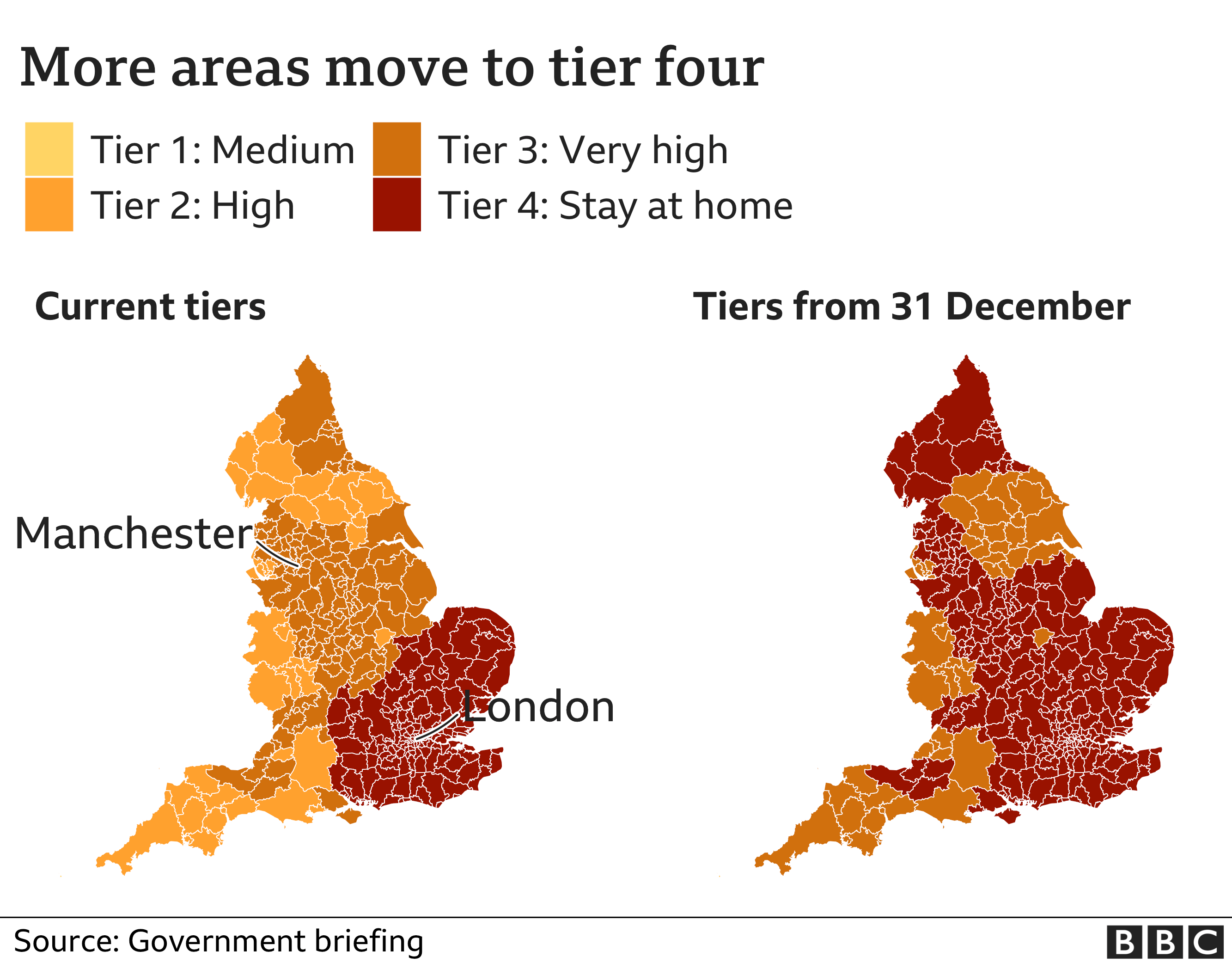
What are the new restrictions in Scotland?
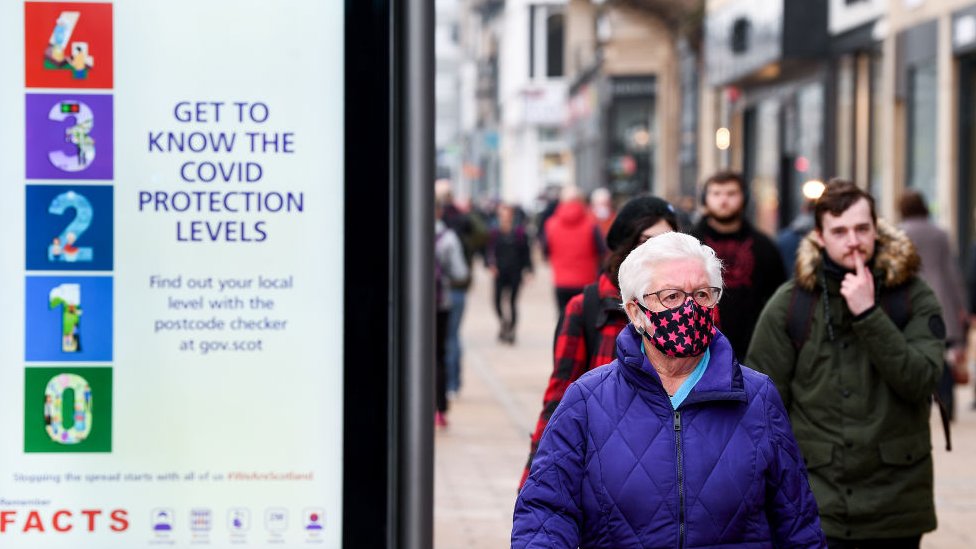
From Boxing Day, level four lockdown measures are in place across mainland Scotland for three weeks. Orkney, Shetland, the Western Isles and other island communities are in level three.
Scotland has five levels of restrictions – from zero to four.
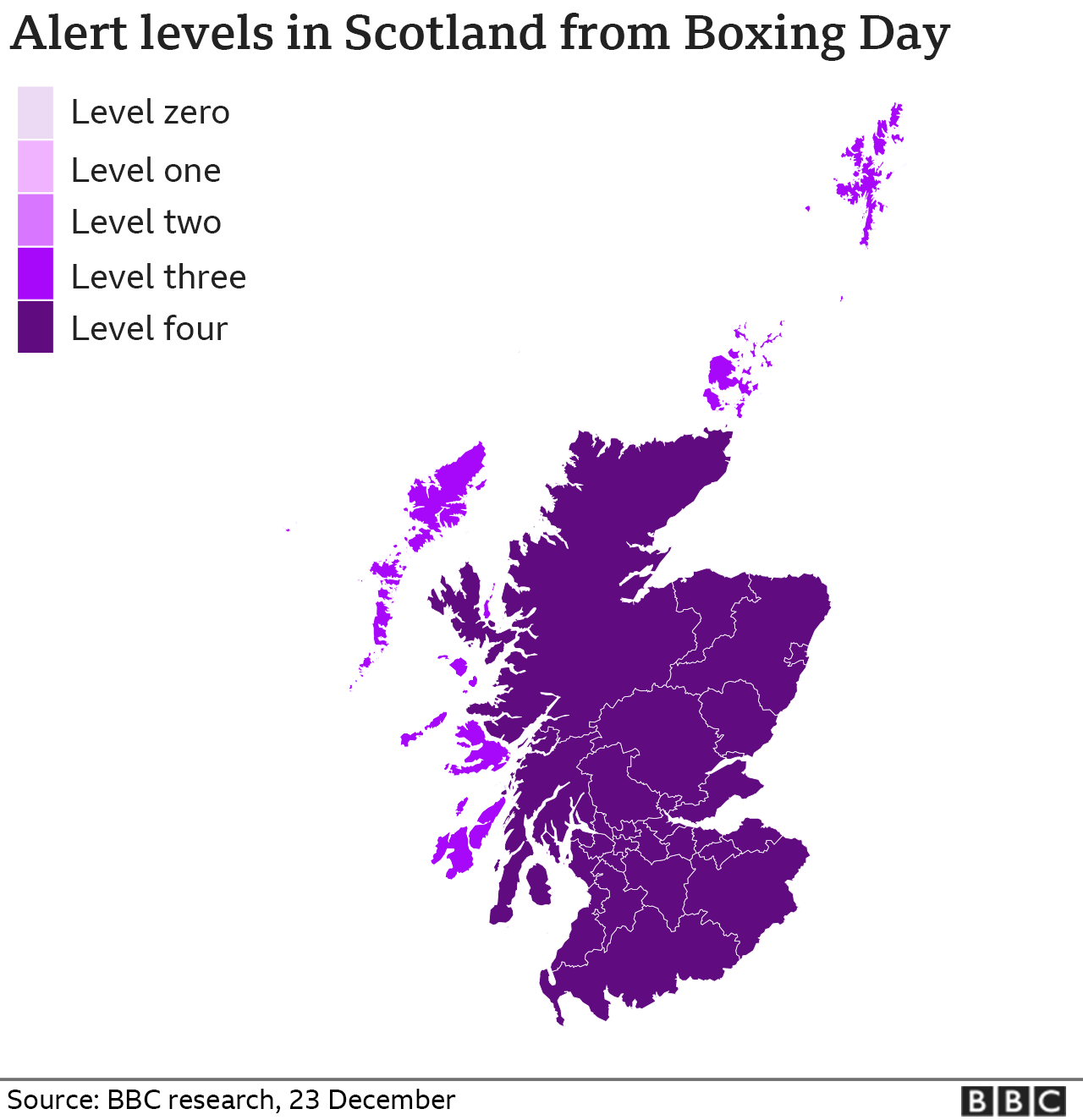

Level four (lockdown) rules
Indoors:
- No household mixing
- Exceptions include providing care to a “vulnerable person”, or “extended households” to reduce loneliness
- Children can move between homes of separated parents
Outdoors:
- Up to two households – no more than six adults – can meet in a private garden or a public place like a park
- Children under 12 are not counted and don’t need to social distance
- Young people aged 12 to 17 can meet in groups of up to six outdoors – they’re not subject to the two-household limit, but need to be physically distanced
Pubs, cafes & holiday accommodation:
- Restaurants, cafes, pubs and bars must close – but takeaways can operate as normal
- Holiday accommodation must close – but hotels, B&Bs and self-catering can open for essential customers (such as people staying for work)
- Hotels and other accommodation providers can serve food up to 10pm to guests
Supermarkets, clothes shops & markets:
- Only essential shops can open, and must follow Covid-safe guidelines
- Click and collect, on-line services and outdoor retail, such as garden centres can open
- Hairdressers, nail salons and other close contact services must close
Sport, leisure & entertainment:
- Indoor sports facilities, including gyms, must close
- You can meet others outdoors for informal exercise or sport – outdoor gyms can remain open
- Outdoor non-contact sports are permitted
- Leisure and entertainment premises, including cinemas, must close
- Film and TV production can continue
- Public buildings, such as libraries, must close – but libraries can operate click and collect
Places of worship:
- Places of worship can open with social distancing and a maximum 20 people
- Wedding ceremonies and civil partnerships, are allowed with social distancing and a maximum 20 people
- Wedding receptions are not allowed
- Funerals and wakes can take place with a maximum of 20 guests
Education:
- Schools, colleges and universities can remain open
- Early learning and childcare can remain open
- Informal childcare is only allowed for parents or guardians employed in essential services

Level three (very high) rules
- Pubs and restaurants can open until 18:00, but alcohol can’t be served
- Leisure and entertainment venues must close
- Non-essential travel in or out of the area is not allowed
- Indoor gym use is restricted to individuals
- Hairdressers and barbers can open

Level two (high) rules
- No gatherings inside homes
- Up to six people from two households can meet outdoors or at a pub or restaurant
- Most hospitality venues can open
- Alcohol can be served indoors with a meal until 20:00 and outdoors until 22:30
- Most leisure premises must close except gyms, cinemas, bingo halls and amusement arcades

Level one (medium) rules
- No gatherings inside homes – unless you live on an island with no road link to the mainland, where six people can gather from two households
- Up to eight people from three households can meet outdoors
- Hospitality has a 22:30 curfew
- Events, like weddings, are restricted to a maximum of 20 people
- Indoor contact sports for adults are not permitted
- Work from home if you can

Level zero (nearly normal) rules
- Face-covering, hygiene and social-distancing rules still apply
- Indoor meetings are allowed with up to eight people from three households
- Up to 15 people from five households can meet outdoors
- Restaurants, cafes, pubs and bars can serve food and alcohol indoors (a maximum of eight people from three households) and outdoors (a maximum of 15 people from five households)
- Nightclubs and adult entertainment venues must close, but all other leisure venues can open
What are Northern Ireland’s rules?
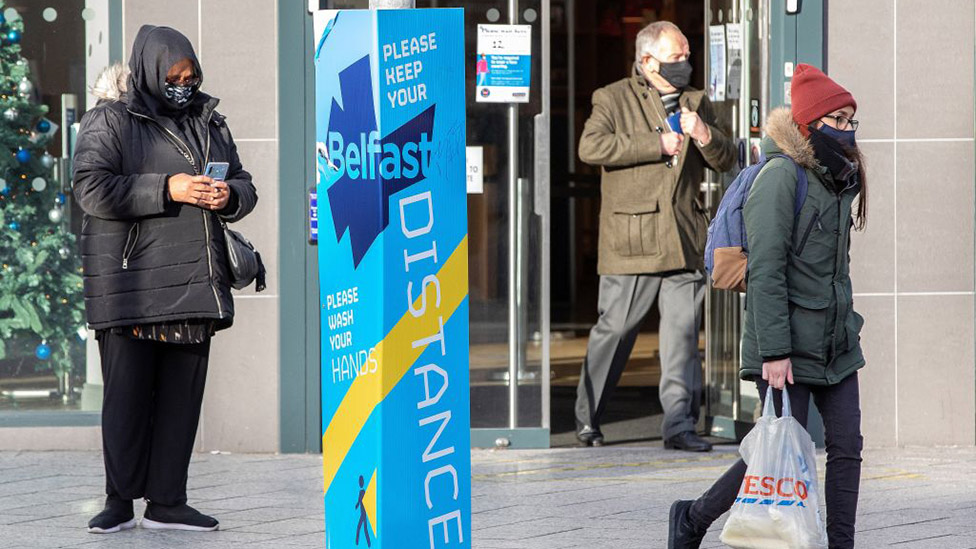
A six-week lockdown began in Northern Ireland on Boxing Day.
The first week, until 2 January, has stricter restrictions, including essential shops closing at 20:00 GMT and no sport.
The new rules include:
- Closure of all non-essential shops, including garden centres and homeware shops
- No click-and-collect services
- Closure of hair and beauty salons
- Hospitality businesses open only for takeaway and delivery
- Leisure and entertainment venues must close
- Off-licences must close by 20:00
- Car washes must close
- Hotels can open until 28 December for Christmas travellers
- Weddings, civil partnership ceremonies and funerals limited to 25 people – wedding receptions not allowed
- Churches can open, but with measures such as compulsory face masks
- Elite sport allowed behind closed doors from 2 January
Read Northern Ireland’s official guidance.
What are the rules in Wales?
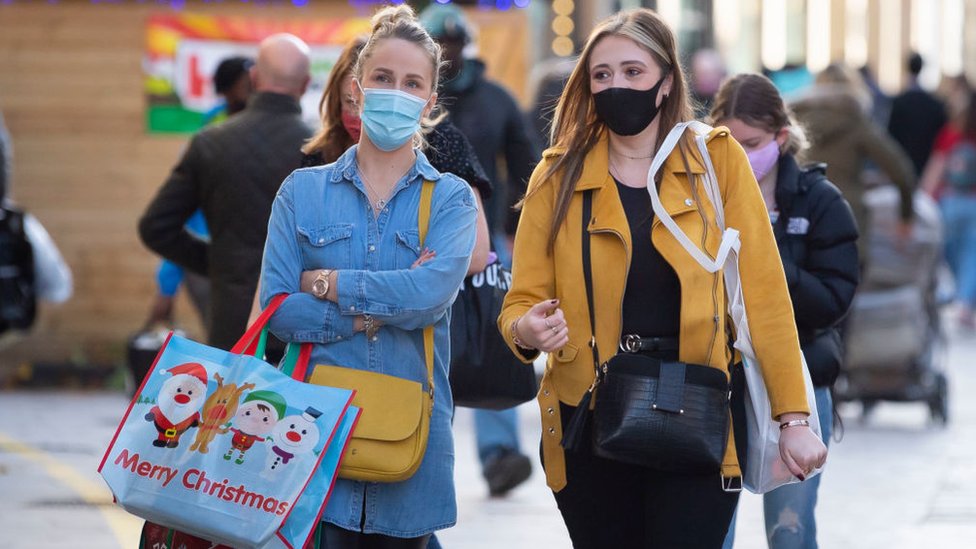
Wales has a national lockdown. The new level four measures mean that:
- You must stay at home, except for very limited purposes
- You must not visit other households, or meet other people you do not live with, unless they are in your support bubble
- Many types of businesses are required to close
- Wedding receptions and wakes are not allowed
You should also:
- Work from home if you can
- Not travel without reasonable excuse
- Not travel internationally without reasonable excuse
The following must close:
- Venues for events and conferences
- Entertainment venues including theatres and concert halls
- Indoor and outdoor visitor attractions
- Sport courts, golf courses, leisure and fitness facilities
- Holiday accommodation
- Pubs, bars and cafes (except for takeaway and delivery)
- Hairdressers and nail salons
- Non-essential shops (click and collect allowed)
- Libraries (click and collect only)

Leave a Reply